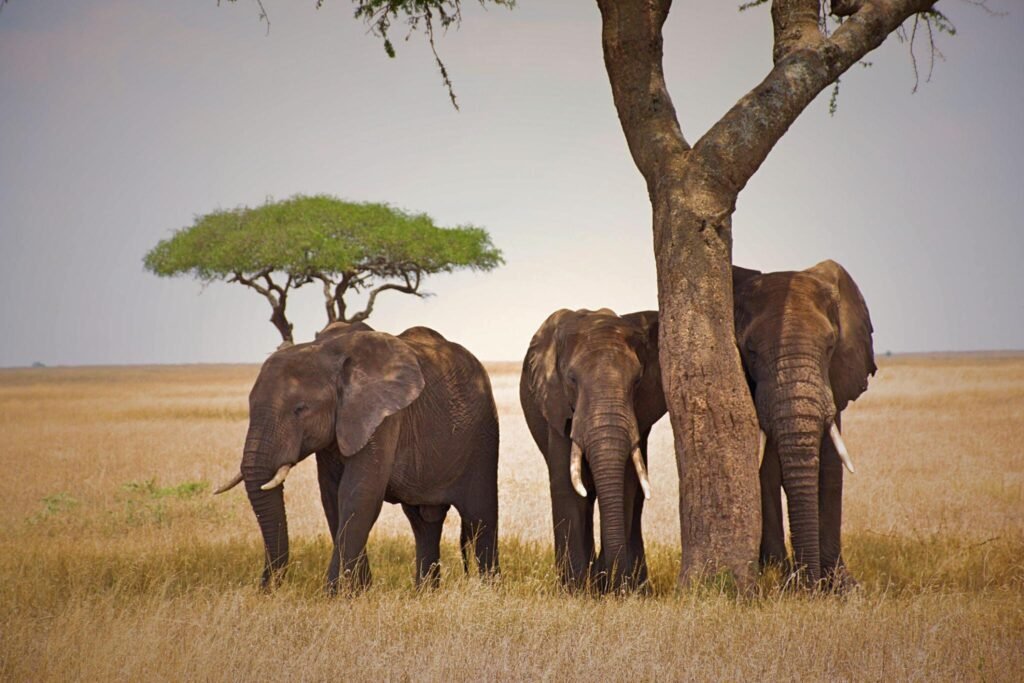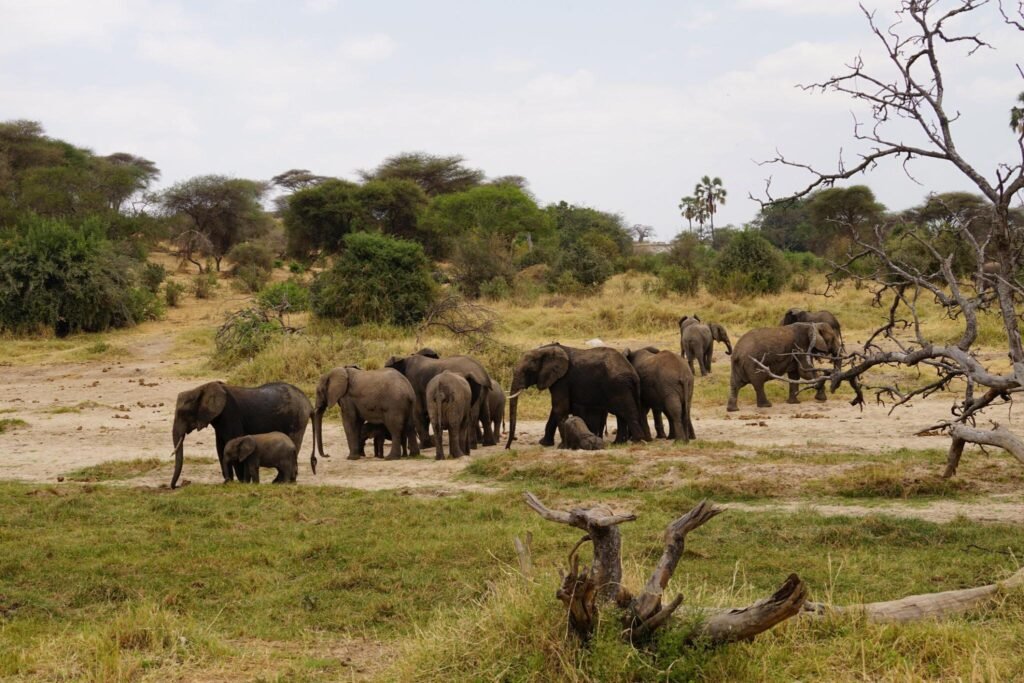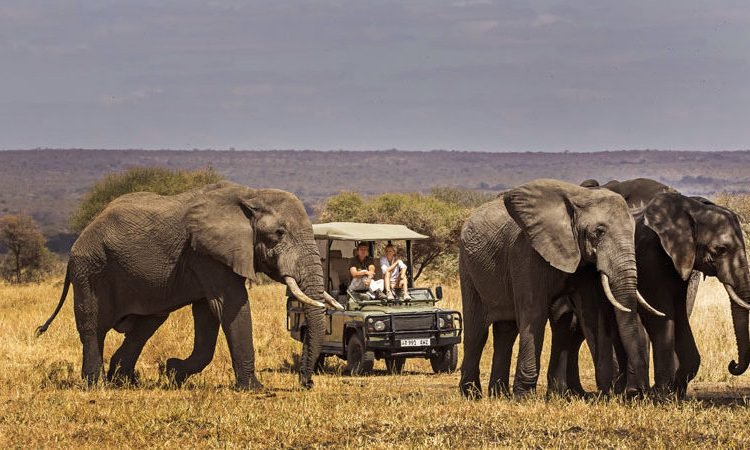10 Interesting Facts About Elephants : Elephants are among the most fascinating animals on the planet. Known for their intelligence, social behavior, and sheer size, these gentle giants have captivated human interest for centuries. Whether you’re planning to see them on an African safari or simply want to learn more about these incredible creatures, here are 10 interesting facts about elephants that will deepen your appreciation for them.
Learn more about safari experiences and elephant tours.

10 Interesting Facts About Elephants : Elephants Are the Largest Land Animals on Earth
Elephants hold the title of the largest land animals on the planet. African elephants can weigh up to 12,000 pounds (5,443 kg) and grow up to 13 feet (4 meters) tall at the shoulder. Asian elephants, while slightly smaller, are still massive, with males weighing around 11,000 pounds (5,000 kg).
- African Elephant: Larger ears, found mainly in Sub-Saharan Africa.
- Asian Elephant: Smaller ears and domesticated in many regions of Asia.
Explore the differences between African and Asian elephants.
10 Interesting Facts About Elephants : Elephants Are Highly Intelligent and Emotional Animals
Elephants are known for their remarkable intelligence. Their brains are highly developed, weighing about 11 pounds (5 kg)—the largest of any land animal. They display complex behaviors, such as problem-solving, using tools, and even mourning their dead. Elephants can form strong bonds with family members and show emotions like joy, grief, and compassion.
- Memory: Elephants are said to have incredible memories, allowing them to recognize long-lost friends and relatives even after decades.
Learn more about elephant intelligence and social behavior.
3. Elephants Are Key to Ecosystem Balance
Elephants play a crucial role in maintaining the ecosystems they inhabit. Known as ecosystem engineers, they help shape their environment by knocking down trees, which promotes the growth of grasslands and creates habitats for smaller animals. Additionally, their dung disperses seeds, helping with plant regeneration.
- Tree Destruction: While it may seem destructive, elephants breaking trees helps maintain the balance between woodlands and grasslands.
Find out how elephants impact ecosystems.
10 Interesting Facts About Elephants : Elephants Have Incredibly Sensitive Trunks
An elephant’s trunk is one of the most versatile and sensitive tools in the animal kingdom. It’s an elongated nose fused with the upper lip, containing more than 40,000 muscles. Elephants use their trunks for a wide range of tasks, from picking up small objects and greeting each other to drinking water and taking dust baths.
- Sense of Smell: Elephants have a keen sense of smell, capable of detecting water sources up to 12 miles (20 kilometers) away.
Discover more about the function of an elephant’s trunk.
10 Interesting Facts About Elephants : Elephants Are Excellent Communicators
Elephants use a wide variety of sounds to communicate, ranging from loud trumpeting to low-frequency rumbles known as infrasound. These low rumbles can travel long distances, allowing elephants to communicate with each other over several miles. They also use body language, such as flapping their ears or intertwining trunks to express affection.
- Infrasound: This low-frequency sound helps elephants communicate across large distances, especially when visibility is limited in thick forests or at night.
Learn more about how elephants communicate.
10 Interesting Facts About Elephants : Elephant Herds Are Led by Matriarchs
Elephant herds are matriarchal, meaning they are led by the oldest and wisest female. The matriarch is responsible for guiding the group to food and water sources and making decisions that affect the entire herd. Her leadership is crucial for the survival of the herd, especially in times of drought or scarcity.
- Matriarch’s Role: The matriarch passes on her knowledge of migration routes, water sources, and survival strategies to younger elephants.
Read more about the role of the matriarch in elephant herds.
10 Interesting Facts About Elephants : Elephants Are Herbivores, Eating Hundreds of Pounds of Food Daily
Elephants are herbivores, consuming large amounts of vegetation each day. An adult elephant can eat up to 300 pounds (136 kg) of food daily, including grass, leaves, bark, and fruits. To sustain their massive bodies, they spend around 16 hours a day eating.
- Diet: Elephants often migrate long distances to find enough food and water, which is why they are constantly on the move.
Discover more about an elephant’s diet and foraging habits.
10 Interesting Facts About Elephants : Baby Elephants Weigh Around 250 Pounds at Birth
Elephants have one of the longest gestation periods of any mammal, lasting about 22 months. When born, a baby elephant, also known as a calf, can weigh around 250 pounds (113 kg). Calves are dependent on their mothers for milk for the first 2-3 years of life, and they stay close to the herd for protection and social learning.
- Maternal Care: Elephant calves are cared for not just by their mothers but also by other females in the herd, a behavior known as allomothering.
Learn more about elephant reproduction and calf care.
10 Interesting Facts About Elephants : Elephants Have Strong Family Bonds
Elephants live in tight-knit family groups, primarily made up of related females and their offspring. These herds can have up to 20 elephants, though several herds may come together in larger groups during migration. Elephants are known for their loyalty to one another, especially when a member of the herd is sick or injured.
- Social Structure: Males typically leave the herd when they reach adolescence and either live alone or form bachelor groups.
Explore the social life of elephants.
Elephants Are Facing Threats from Poaching and Habitat Loss
Despite their importance to ecosystems and their cultural significance, elephants are under threat from poaching and habitat destruction. The illegal ivory trade has caused a dramatic decline in elephant populations, especially in parts of Africa. Additionally, habitat loss due to agricultural expansion and human-wildlife conflict puts further pressure on these majestic creatures.
- Conservation Efforts: Numerous organizations are working to protect elephants through anti-poaching initiatives, habitat conservation, and education programs.
Support elephant conservation efforts here.

10 Interesting Facts About Elephants : Conclusion
Elephants are truly remarkable animals, known for their intelligence, emotional depth, and importance to their ecosystems. Learning about them helps us appreciate their role in the wild and the challenges they face. As threats to their survival continue, it’s more important than ever to support efforts that protect and preserve these magnificent creatures.
For more information on safari tours and how to see elephants in their natural habitat, visit Kilimanjaro Climb Specialist or Eddy Tours & Safaris.

